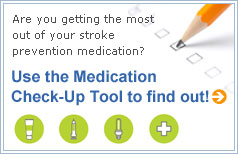A stroke is a sudden interruption of blood flow to the brain. Without the oxygen and nutrients carried by the blood, brain cells begin to die. The longer blood flow is interrupted, the greater the risk of permanent brain damage and death.
There are two common types of stroke:
| Type of stroke |
What happens |
| Ischemic stroke (80% of strokes) |
A blood clot blocks blood flow to the brain. Ischemic strokes may be:
- thrombotic: A blood clot forms in a blood vessel in the brain and blocks it.
- embolic: A blood clot forms in another part of the body (such as the heart), moves into the brain, and blocks a blood vessel.
|
| Hemorrhagic stroke (20% of strokes) |
Blood vessels rupture in the brain, causing blood to leak out. The leaking blood and the interruption of normal blood flow damage the brain. |
Depending on the part of the brain affected, strokes can affect your vision, mobility, thoughts, memory, and speech. See "How could a stroke affect my health and lifestyle?" to learn more.
Some people may have a "mini-stroke," also called a TIA (transient ischemic attack). With a TIA, the blood flow to the brain is temporarily blocked. A TIA causes the same symptoms as a stroke, but the symptoms usually disappear within 24 hours. However, a TIA is still very serious because it could still cause brain damage, and because it is a warning that you are at risk of a stroke.






